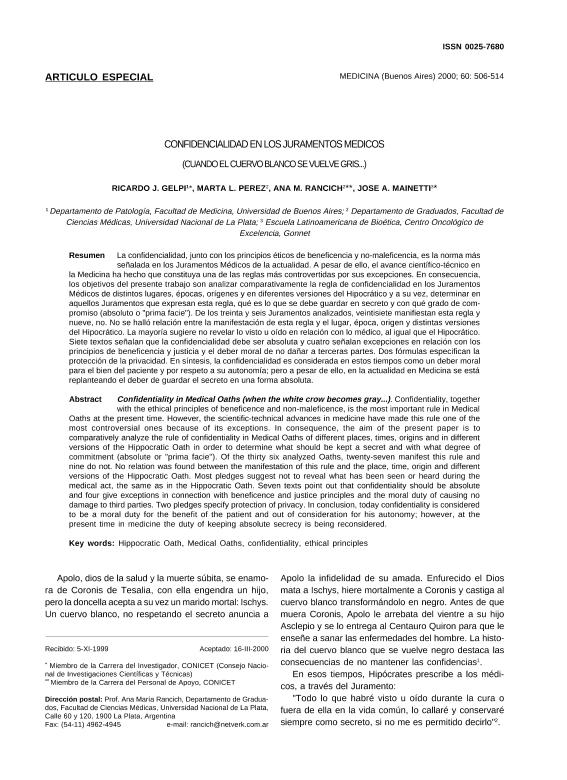Artículo
La confidencialidad, junto con los principios éticos de beneficencia y no-maleficencia, es la norma más señalada en los Juramentos Médicos de la actualidad. A pesar de ello, el avance científico-técnico en la Medicina ha hecho que constituya una de las reglas más controvertidas por sus excepciones. En consecuencia, los objetivos del presente trabajo son analizar comparativamente la regla de confidencialidad en los Juramentos Médicos de distintos lugares, épocas, orígenes y en diferentes versiones del Hipocrático y a su vez, determinar en aquellos Juramentos que expresan esta regla, qué es lo que se debe guardar en secreto y con qué grado de compromiso (absoluto o "prima facie"). De los treinta y seis Juramentos analizados, veintisiete manifiestan esta regla y nueve, no. No se halló relación entre la manifestación de esta regla y el lugar, época, origen y distintas versiones del Hipocrático. La mayoría sugiere no revelar lo visto u oído en relación con lo médico, al igual que el Hipocrático. Siete textos señalan que la confidencialidad debe ser absoluta y cuatro señalan excepciones en relación con los principios de beneficencia y justicia y el deber moral de no dañar a terceras partes. Dos fórmulas especifican la protección de la privacidad. En síntesis, la confidencialidad es considerada en estos tiempos como un deber moral para el bien del paciente y por respeto a su autonomía; pero a pesar de ello, en la actualidad en Medicina se está replanteando el deber de guardar el secreto en una forma absoluta. Confidentiality, together with the ethical principles of beneficence and non-maleficence, is the most important rule in Medical Oaths at the present time. However, the scientific-technical advances in medicine have made this rule one of the most controversial ones because of its exceptions. In consequence, the aim of the present paper is to comparatively analyze the rule of confidentiality in Medical Oaths of different places, times, origins and in different versions of the Hippocratic Oath in order to determine what should be kept a secret and with what degree of commitment (absolute or "prima facie"). Of the thirty six analyzed Oaths, twenty-seven manifest this rule and nine do not. No relation was found between the manifestation of this rule and the place, time, origin and different versions of the Hippocratic Oath. Most pledges suggest not to reveal what has been seen or heard during the medical act, the same as in the Hippocratic Oath. Seven texts point out that confidentiality should be absolute and four give exceptions in connection with beneficence and justice principles and the moral duty of causing no damage to third parties. Two pledges specify protection of privacy. In conclusion, today confidentiality is considered to be a moral duty for the benefit of the patient and out of consideration for his autonomy; however, at the present time in medicine the duty of keeping absolute secrecy is being reconsidered.
Confidencialidad en los juramentos médicos: (cuando el cuervo blanco se vuelve gris...)
Título:
Confidentiality in Medical Oaths: (when the white crow becomes gray...)
Fecha de publicación:
08/2000
Editorial:
Fundación Revista Medicina
Revista:
Medicina (Buenos Aires)
ISSN:
0025-7680
e-ISSN:
1669-9106
Idioma:
Español
Tipo de recurso:
Artículo publicado
Clasificación temática:
Resumen
Palabras clave:
Hippocratic Oath
,
Medical Oaths
,
Confidentiality
,
Ethical Principles
Archivos asociados
Licencia
Identificadores
Colecciones
Articulos(IBIMOL)
Articulos de INSTITUTO DE BIOQUIMICA Y MEDICINA MOLECULAR
Articulos de INSTITUTO DE BIOQUIMICA Y MEDICINA MOLECULAR
Citación
Gelpi, Ricardo Jorge; Pérez, Marta L.; Rancich, Ana María; Mainetti, Jose Alberto; Confidencialidad en los juramentos médicos: (cuando el cuervo blanco se vuelve gris...); Fundación Revista Medicina; Medicina (Buenos Aires); 60; 4; 8-2000; 506-514
Compartir




